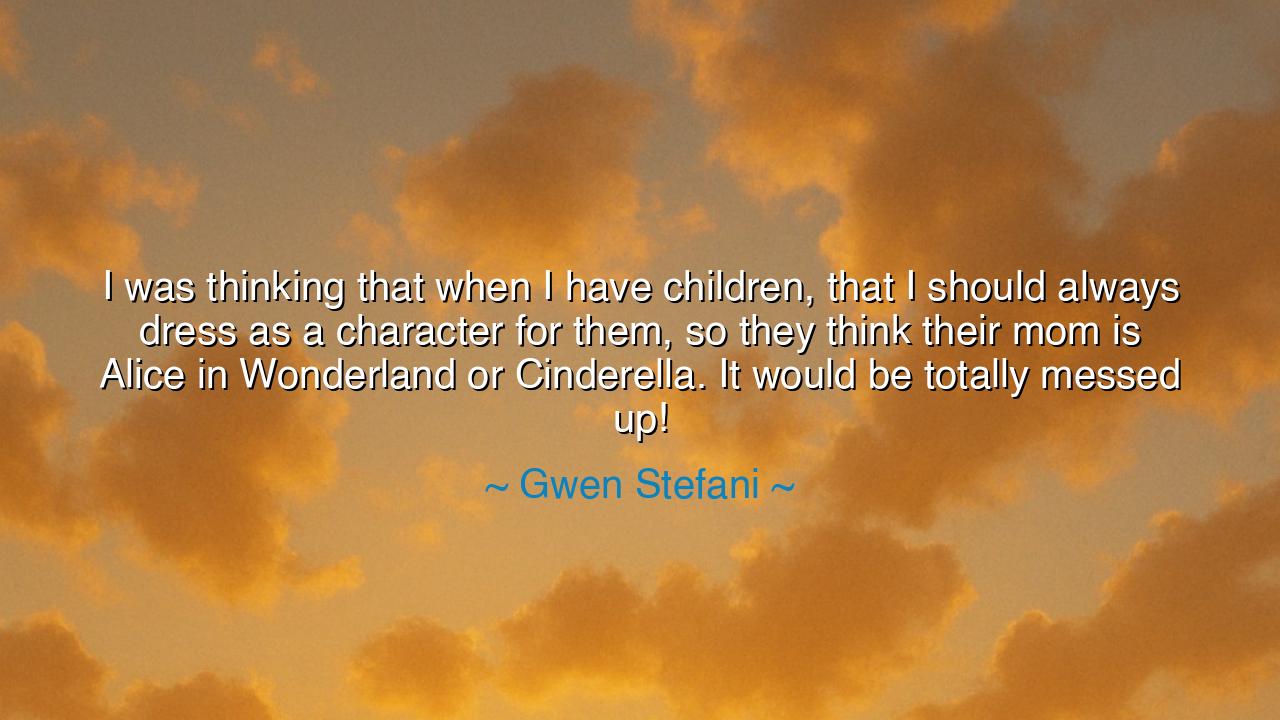
I was thinking that when I have children, that I should always
I was thinking that when I have children, that I should always dress as a character for them, so they think their mom is Alice in Wonderland or Cinderella. It would be totally messed up!






The words of Gwen Stefani, spoken half in jest and half in dream, strike with an image at once whimsical and profound: “I was thinking that when I have children, that I should always dress as a character for them, so they think their mom is Alice in Wonderland or Cinderella. It would be totally messed up!” Behind the playful tone, there lies an ancient truth about the power of imagination, the mystery of parenthood, and the delicate line between fantasy and reality in the raising of children.
The origin of these words rests in Stefani’s world of art and performance, for she herself is a creature of style and transformation. A singer who made her name not only with voice but with image, she understands the magic of costume and character. To a child, the mother is already larger than life, a guardian, a queen, a being of wonder. By imagining herself as Alice in Wonderland or Cinderella, Stefani toys with the idea of magnifying that awe—becoming for her children not just a mother, but a walking storybook. Yet she also recognizes, with laughter, that such constant disguise could be “totally messed up,” for children must see their mother not only as fantasy, but as truth.
This vision recalls the tales of the ancients, when parents often clothed themselves in myth to inspire their children. In ancient Egypt, mothers and fathers told their children that the Pharaoh was Horus, the son of the gods, so that reverence might grow in their hearts. In Greece, storytellers dressed in masks to become gods and heroes, passing lessons of courage, wisdom, and folly. To a child, to see the parent become such a figure is to live within wonder. Yet the ancients also warned: illusion without grounding can confuse the heart. Just as Stefani intuits, it would be strange to live forever in costume, for children need to know not only myth, but the flesh-and-blood parent who loves them.
Her thought also unveils the deeper truth that parents are, in some sense, always characters in their children’s eyes. To one child, a mother is a warrior who defends against fear; to another, she is a healer who tends to wounds; to all, she is a figure greater than herself. Stefani’s words remind us that childhood is shaped as much by imagination as by reality, and that parents must navigate both. They must give their children wonder, but also stability; stories, but also truth.
The humor of her quote hides a wisdom about the role of play in parenting. To dress as Alice or Cinderella is absurd if done without limit, but to bring joy and creativity into a child’s world is essential. The parent who can laugh, pretend, and create stories nourishes the child’s spirit just as much as the parent who provides food and shelter. To be only serious is to deny the child’s world of imagination; to be only playful is to deny the child’s need for grounding. The art of parenting, as Stefani’s playful remark hints, lies in balancing the two.
The lesson for us is this: do not be afraid to bring wonder into the lives of your children, but never forget to anchor them in truth. Imagination is a gift, but stability is a necessity. A mother who can sing a lullaby like a fairy queen and also stand firm in discipline is more powerful than any storybook character. The child who grows with both delight and guidance learns not only to dream, but to live wisely.
Practically, this means parents should embrace moments of play—costumes, stories, adventures—but also show their children honesty and vulnerability. Let them see you as both magician and human. Show them joy, but also responsibility. For in this balance, they will learn that the world is both wondrous and real, both enchanted and demanding, and that they too can live fully in both realms.
Thus, Gwen Stefani’s playful words become more than a joke. They become a teaching: parenthood is a dance between fantasy and truth, between character and authenticity. To raise children well is to inspire their imagination while preparing them for reality. Let us then, like wise storytellers, give them both wonder and wisdom, so that they may grow into beings who can face the world with courage and still see its beauty with childlike eyes.






AAdministratorAdministrator
Welcome, honored guests. Please leave a comment, we will respond soon